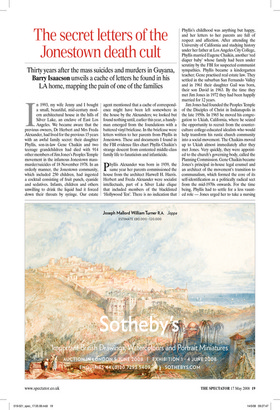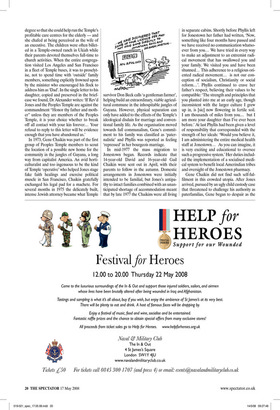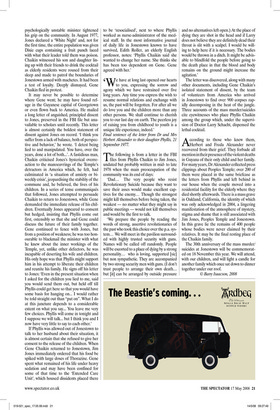The secret letters of the Jonestown death cult
Thirty years after the mass suicides and murders in Guyana, Barry Isaacson unveils a cache of letters he found in his LA home, mapping the pain of one of the families In 1993, my wife Jenny and I bought a small, beautiful, mid-century modern architectural house in the hills of Silver Lake, an enclave of East Los Angeles. We became aware that the previous owners, Dr Herbert and Mrs Freda Alexander, had lived for the previous 15 years with an awful family secret: their daughter Phyllis, son-in-law Gene Chaikin and two teenage grandchildren had died with 914 other members of Jim Jones’s Peoples Temple movement in the infamous Jonestown massmurder/suicides of 18 November 1978. In an orderly manner, the Jonestown community, which included 250 children, had ingested a cocktail consisting of fruit punch, cyanide and sedatives. Infants, children and others unwilling to drink the liquid had it forced down their throats by syringe. Our estate agent mentioned that a cache of correspondence might have been left somewhere in the house by the Alexanders; we looked but found nothing until, earlier this year, a handyman emerged from the foundations with a battered vinyl briefcase. In the briefcase were letters written to her parents from Phyllis in Jonestown. These and documents I found in the FBI evidence files chart Phyllis Chaikin’s strange descent from contented middle-class family life to fanaticism and infanticide.
Phyllis Alexander was born in 1939, the same year her parents commissioned the house from the architect Harwell H. Harris. Herbert and Freda Alexander were socialist intellectuals, part of a Silver Lake clique that included members of the blacklisted ‘Hollywood Ten’. There is no indication that Phyllis’s childhood was anything but happy, and her letters to her parents are full of respect and affection. After attending the University of California and studying history under her father at Los Angeles City College, Phyllis married Eugene Chaikin, another ‘red diaper baby’ whose family had been under scrutiny by the FBI for suspected communist sympathies. Phyllis became a kindergarten teacher; Gene practised real estate law. They settled in the suburban San Fernando Valley and in 1961 their daughter Gail was born, their son David in 1963. By the time they met Jim Jones in 1972 they had been happily married for 12 years.
Jim Jones had founded the Peoples Temple of the Disciples of Christ in Indianapolis in the late 1950s. In 1965 he moved his congregation to Ukiah, California, where he seized the opportunity to recruit from the counterculture college-educated idealists who would help transform his rustic church community into a social movement. The Chaikins moved up to Ukiah almost immediately after they met Jones. Very quickly, they were appointed to the church’s governing body, called the Planning Commission. Gene Chaikin became Jones’s principal in-house legal counsel and an architect of the movement’s transition to communalism, which formed the core of its self-identification as a politically radical sect from the mid-1970s onwards. For the time being, Phyllis had to settle for a less vaunted role — Jones urged her to take a nursing degree so that she could help run the Temple’s profitable care centres for the elderly — and she chafed at being perceived as the wife of an executive. The children were often billeted in a Temple-owned ranch in Ukiah while their parents devoted themselves full-time to church activities. When the entire congregation visited Los Angeles and San Francisco in a fleet of Temple buses, it was to proselytise, not to spend time with ‘outside’ family members, something explicitly frowned upon by the minister who encouraged his flock to address him as ‘Dad’. In the single letter to his daughter, copied and preserved in the briefcase we found, Dr Alexander writes: ‘If Rev’d Jones and the Peoples Temple are against the commandment “Honor thy father and mother” unless they are members of the Peoples Temple, it is your choice whether to break off all contact with your kin forever... Your refusal to reply to this letter will be evidence enough that you have abandoned us.’ In 1973, Gene Chaikin was part of the first group of Peoples Temple members to scout the location of a possible new home for the community in the jungles of Guyana, a long way from capitalist America. An avid horticulturalist and too ingenuous to be the kind of Temple ‘operative’ who helped Jones stage fake faith healings and exercise political muscle in San Francisco, Chaikin gratefully exchanged his legal pad for a machete. For several months in 1975 the delicately built, intense Jewish attorney became what Temple survivor Don Beck calls ‘a gentleman farmer’, helping build an extraordinary, viable agricultural commune in the inhospitable jungles of Guyana. However, physical separation can only have added to the effects of the Temple’s ideological disdain for marriage and conventional family life. As the organisation moved towards full communalism, Gene’s commitment to his family was classified as ‘paternalistic’ and Phyllis was reported as feeling ‘repressed’ in her bourgeois marriage.
In mid-1977 the mass migration to Jonestown began. Records indicate that 14-year-old David and 16-year-old Gail Chaikin were sent out in April, with their parents to follow in the autumn. Domestic arrangements in Jonestown were initially intended to be familial, but Jones’s antipathy to intact families combined with an unanticipated shortage of accommodation meant that by late 1977 the Chaikins were all living in separate cabins. Shortly before Phyllis left for Jonestown her father had written, ‘Now, something like four months have passed and we have received no communication whatsoever from you... We have tried in every way to make an adjustment to an extremist radical movement that has swallowed you and your family. We visited you and have been shunned... This adherence to a religious oriented radical movement... is not our conception of socialism, Christianity or social reform...’. Phyllis continued to crave her father’s respect, believing their values to be compatible: ‘The strength and principles that you planted into me at an early age, though inconsistent with the larger culture I grew up in, is [sic] now flowering in fertile soil. I am thousands of miles from you... but I am more your daughter than I’ve ever been before.’ At last Phyllis had been given a level of responsibility that corresponded with the strength of her ideals: ‘Would you believe it, I am administering the entire medical health staff at Jonestown... As you can imagine, it is very exciting and educational to oversee such a progressive system.’ Her duties included the implementation of a socialised medical system to benefit local Amerindian tribes and oversight of the Jonestown pharmacy.
Gene Chaikin did not find such self-fulfilment in this crowded utopia. After Jones arrived, pursued by an ugly child custody case that threatened to challenge his authority as paterfamilias, Gene began to despair as the psychologically unstable minister tightened his grip on the community. In August 1977, Jones declared a ‘White Night’ and, not for the first time, the entire population was given Dixie cups containing a fruit punch laced with what their leader told them was poison. Chaikin witnessed his son and daughter lining up with their friends to drink the cocktail as elderly residents were roused from their sleep and made to patrol the boundaries of Jonestown armed with machetes. It had been a test of loyalty. Deeply dismayed, Gene Chaikin fled in protest.
It may never be possible to determine where Gene went; he may have found refuge in the Guyanese capital of Georgetown or even flown back to America. He mailed a long letter of anguished, principled dissent to Jones, preserved in the FBI file but unavailable to scholars until recently. This letter is almost certainly the boldest statement of dissent against Jones on record. ‘I think you suffer from a lack of balance, both of perspective and behavior,’ he wrote. ‘I detest being lied to and manipulated. You have, over the years, done a lot of both...’. A fastidious man, Chaikin criticised Jones’s hysterical overreaction to the manoeuvrings of the Temple’s detractors in America which, he felt, had culminated in ‘a situation of anxiety or biweekly crisis’, jeopardising the stability of the commune and, he believed, the lives of his children. In a series of tense communiqués that followed, Jones attempted to persuade Chaikin to return to Jonestown, while Gene demanded the immediate release of his children. Eventually Jones appeared to consent but hedged, insisting that Phyllis come out first, ostensibly so that she and Gene could discuss the future of their family together. Gene continued to fence with Jones, but from a position of weakness; he was too honourable to blackmail the minister with what he knew about the inner workings of the Temple, yet, unlike other defectors, he was incapable of deserting his wife and children. His only hope was that Phyllis might support him in his attempt to liberate their children and reunite his family. He signs off his letter to Jones: ‘Even in the present situation when I asked for the children you lied to me, said you would send them out, but held off till Phyllis could get here so that you would have some basis for hanging on... I would rather be told straight out than “put on”. What I do at this juncture depends to a considerable extent on what you say... You leave me very few choices. Phyllis will come in tonight and I suppose we will talk... but I think you and I now have very little to say to each other.’ If Phyllis was allowed out of Jonestown to talk to her husband about their situation, it is almost certain that she refused to give her consent to the release of the children. When Gene Chaikin returned to Jonestown, Jim Jones immediately ordered that his food be spiked with large doses of Thorazine. Gene spent what remained of his life under heavy sedation and may have been confined for some of that time to the ‘Extended Care Unit’, which housed dissidents placed there to be ‘resocialised’, next to where Phyllis worked as nurse-administrator of the medical staff. In the most informative journal of daily life in Jonestown known to have survived, Edith Roller, an elderly English professor, notes: ‘Phyllis Chaikin said she wanted to change her name. She thinks she has been too dependent on Gene. Gene agreed with her.’ ‘We have at long last opened our heartsto you, expressing the sorrow and agony which we have restrained over five long years. Any time you express the wish to resume normal relations and exchange with us, the past will be forgotten. For after all we do love you and the children more than any other persons. We shall continue to cherish you to our last day on earth. The peerless joy of raising you from childhood to youth is a unique life experience, indeed.’ Final sentence of the letter from Dr and Mrs Herbert Alexander to their daughter Phyllis, 21 September 1977.
The following is from a letter in the FBI files from Phyllis Chaikin to Jim Jones, undated but probably written in midto late 1978 when the main preoccupation of the community was its end of days: ‘Dad... The very people who resist Revolutionary Suicide because they want to save their asses would make excellent captives for the enemy... Though the strongest might kill themselves before being taken, the weakest — no matter what they might say in public meetings — would not kill themselves and would be the first to talk.
‘We prepare the people by reading the words of strong, assertive revolutionaries of the past who took this choice over the p.a. system... We will meet in the pavilion surrounded with highly trusted security with guns. Names will be called off randomly. People will be escorted to a place of dying by a strong personality... who is loving, supported [sic] but non sympathetic. They are accompanied by two strong security men with guns. (I don’t trust people to arrange their own death... but [it] can be arranged by outside pressure and no alternatives left open.) At the place of dying they are shot in the head and if Larry does not believe they are definitely dead their throat is slit with a scalpel. I would be willing to help here if it is necessary. The bodies would be thrown in a ditch. It might be advisable to blindfold the people before going to the death place in that the blood and body remains on the ground might increase the agitation.’ The letter was discovered, along with many other documents, including Gene Chaikin’s isolated statement of dissent, by the team of volunteers from America who arrived in Jonestown to find over 900 corpses rapidly decomposing in the heat of the jungle. Three accounts of the mass murder/suicides cite eyewitnesses who place Phyllis Chaikin among the group which, under the supervision of Doctor Larry Schacht, dispensed the lethal cocktail.
According to those who knew them, Herbert and Freda Alexander never recovered from their grief. They forbade all mention in their presence of the violent deaths in Guyana of their only child and her family. For many years, Dr Alexander collected press clippings about Peoples Temple; over 200 of them were placed in the same briefcase as the letters from Phyllis and left behind in our house when the couple moved into a residential facility for the elderly where they died shortly afterwards. There is a mass grave in Oakland, California, the identity of which was only acknowledged in 2004, a lingering manifestation of the atmosphere of mystery, stigma and shame that is still associated with Jim Jones, Peoples Temple and Jonestown. In this grave lie the remains of 400 people whose bodies were never claimed by their relatives. It may be the final resting place of the Chaikin family.
The 30th anniversary of the mass murder/ suicides at Jonestown will be commemorated on 18 November this year. We will attend, with our children, and will light a candle for another family which once sat down to dinner together under our roof.












































































 Previous page
Previous page